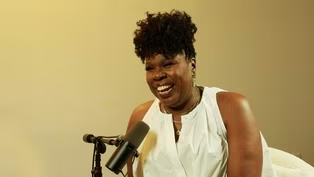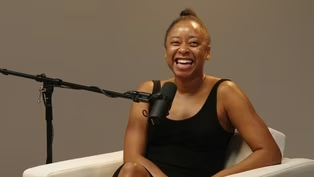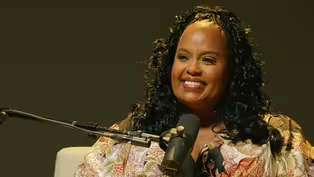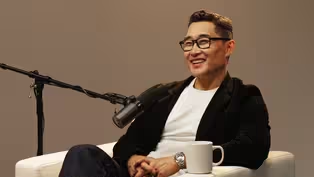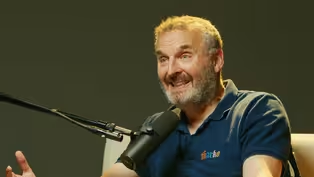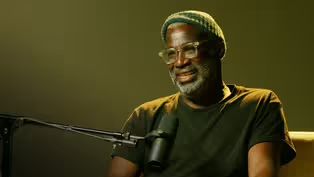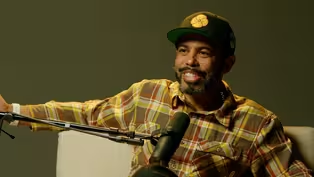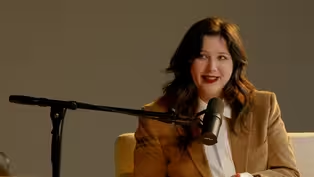
Sarah McLachlan: Making Music to Connect and Heal
Special | 37m 19sVideo has Closed Captions
Singer-songwriter Sarah McLachlan opens up in a candid interview about making music.
In this episode, Sarah McLachlan talks about finding common ground with people from all walks of life. We explore the lasting impact of Lilith Fair, the all-women music festival she founded in the 1990s, and the process behind her new album, Better Broken.
Problems playing video? | Closed Captioning Feedback
Problems playing video? | Closed Captioning Feedback
Support for American Masters is provided by the Corporation for Public Broadcasting, AARP, Rosalind P. Walter Foundation, Judith and Burton Resnick, Blanche and Hayward Cirker Charitable Lead Annuity Trust, Koo...

Sarah McLachlan: Making Music to Connect and Heal
Special | 37m 19sVideo has Closed Captions
In this episode, Sarah McLachlan talks about finding common ground with people from all walks of life. We explore the lasting impact of Lilith Fair, the all-women music festival she founded in the 1990s, and the process behind her new album, Better Broken.
Problems playing video? | Closed Captioning Feedback
How to Watch American Masters
American Masters is available to stream on pbs.org and the free PBS App, available on iPhone, Apple TV, Android TV, Android smartphones, Amazon Fire TV, Amazon Fire Tablet, Roku, Samsung Smart TV, and Vizio.
Buy Now
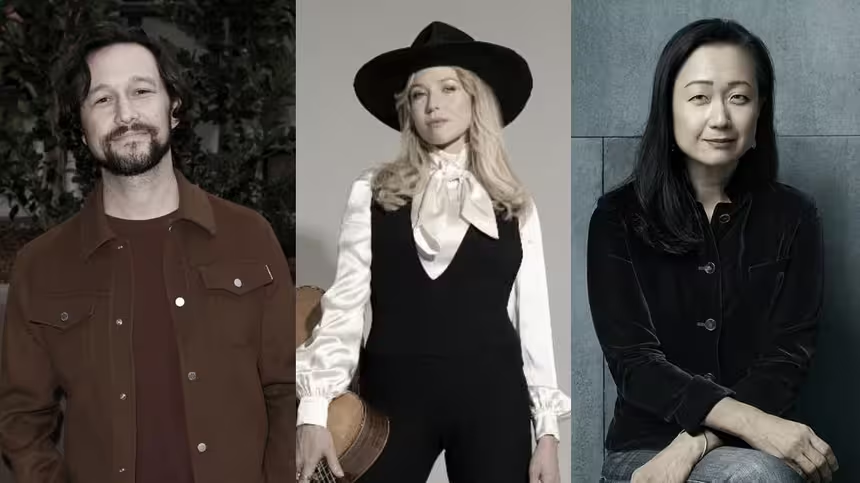
A front row seat to the creative process
How do today’s masters create their art? Each episode an artist reveals how they brought their creative work to life. Hear from artists across disciplines, like actor Joseph Gordon-Levitt, singer-songwriter Jewel, author Min Jin Lee, and more on our podcast "American Masters: Creative Spark."Providing Support for PBS.org
Learn Moreabout PBS online sponsorshipMore from This Collection
How do today’s masters create their art? "Creative Spark" presents narrative interviews that go in-depth with an iconic artist about the creation of a single work. Each episode offers a unique window into the world of art and the creative process of artists and cultural icons across a wide range of disciplines, from music and comedy to poetry and film.
How Leslie Jones Became a Comedian
Video has Closed Captions
Comedian and actress Leslie Jones does a deep dive on her creative process. (31m)
Phoebe Robinson Shows Her Work
Video has Closed Captions
Comedian Phoebe Robinson takes on hustle-culture in biting comedy special. (31m 45s)
How Natasha Rothwell’s Life Brought Her to “The White Lotus”
Video has Closed Captions
Actress Natasha Rothwell on her creative process in "The White Lotus." (33m 40s)
Daniel Dae Kim Leads Spy Drama and Fights for Industry Change
Video has Closed Captions
Actor Daniel Dae Kim on his groundbreaking career and new project, "Butterfly." (21m 48s)
Phil Rosenthal’s Secret Recipe: Good Food and a Laugh
Video has Closed Captions
TV writer and host Phil Rosenthal talks about finding our shared humanity in food and comedy. (22m 53s)
Tunde Adebimpe Channels His DIY Roots Into Raw Solo Debut
Video has Closed Captions
Musician Tunde Adebimpe on his creative process behind his solo album debut. (37m 28s)
Daveed Diggs Takes on Cyberpunk Rap
Video has Closed Captions
Rapper and actor Daveed Diggs on his creative process as a rapper and songwriter. (25m 28s)
Lucy Dacus Makes Her First Loves Songs
Video has Closed Captions
Singer-songwriter Lucy Dacus talks about love songs for her new album, "Forever is a Feeling." (23m 49s)
Providing Support for PBS.org
Learn Moreabout PBS online sponsorship- We need emotional outlets.
We need sometimes other people to speak on our behalf, to articulate things that we can't quite articulate ourselves.
And we need opportunities to feel connection and to feel less alone.
And that, I think, is one of the greatest gifts music has to offer us and the arts in general.
You know, you read something in a poem or you see something in a film, or you hear something in a piece of music where you're like, "Oh my God, that person gets me."
I don't feel so alone anymore.
It's powerful stuff.
(gentle music) - This is American Masters Creative Spark, and I'm your host, Joe Skinner, and that's singer-songwriter Sarah McLachlan.
She's a three-time Grammy Award winner who you know from songs like "I will Remember You," "Angel," and "Building a Mystery."
♪ Holding on and holding it in ♪ ♪ Yeah, you're working ♪ ♪ Building a mystery ♪ - Sarah McLachlan is back with a new album, her 10th, called "Better Broken."
She's also featured in a new documentary called "Lilith Fair: Building A Mystery" about the groundbreaking all women music festival she founded in the mid '90s, which gave voice to a rising generation of artists in Canada and the United States.
She's a Canadian artist with a profound impact here in America.
She was born in Halifax, broke through in Vancouver, and then found her way to New York and Los Angeles.
I met up with Sarah here in LA to talk about that journey and what sparks her creative process.
- I don't think I ever thought about America versus Canada as a young child or where music came from.
I never actually gave it a thought who was Canadian, who wasn't Canadian.
And obviously I grew up on American folk music, Simon & Garfunkel, Joan Baez, because that's what my parents listened to.
So, I never really thought about the cultural divide.
I think for me it was just really exciting to come to new places and see new people and see how different the world could be.
You know, Halifax at the time when I left was pretty parochial and small, and Vancouver by comparison was this, you know, shiny beautiful city on the ocean and with the mountains looming behind it.
And it was really beautiful, but not that dissimilar, although way more cliquey than Halifax, Nova Scotia.
But I loved New York.
I loved the energy of it.
I loved LA, I loved Texas.
Like when I went on tour, that was when I really discovered how vast and beautiful and different the different states are in America, what a huge country it was.
And started to get to know people in different states.
And I don't know, I just, I kinda fell in love with it.
I fell in love with Texas in particular.
I just thought the people there were so kind and open.
You know, I'm also aware that I was traveling in circles of liberal-minded, like-minded people for sure.
But I think what the coolest thing that I discovered, regardless of where I went, was that there was this beautiful commonality in the music, and I could recognize instantly more so now than earlier on, but just people coming from very different walks of life, different cultural backgrounds, but music being this connector where we're all kind of for a moment just human together.
- Could you get into more specifics about that?
Like what was the commonality with the music itself?
- I think that just the emotional energy of it, seeing big, burly grown men cry in front of me who, you know, and again, this is just about me and my, you know, your preexisting ideas of what people might be like because of how they look.
I've had guys that look like they live and breathe death metal and are actually really scary and intimidating and come up to me and say, "I don't listen to death metal and Sarah McLachlan, freaking love you, and you make me cry."
You know, "You bring this emotional world forward for me that I don't know how to access."
You know, so I've had moments like that that have, you know?
I'm just always, almost always pleasantly surprised by people when they defy sort of, the sort of first impression.
- That's always one of the most exciting things about just meeting people in general I find.
- Travel, yeah, and just being open-minded and curious about people.
It's like, where are you from?
What are you interested in, you know?
And it doesn't, these days, of course, it always comes to this political head so quickly.
I just recently went on a cruise and it was very interesting.
I could tell almost instantly who the Democrats were 'cause it was mostly Americans on the board.
It was a very small boat.
Who the Americans or who the Democrats and who the Republicans were because the Democrats mostly came up and apologized profusely to me (chuckles) for what was going on.
And the Republicans were generally, well, you know, it's interesting times.
Things are, you know, there's a lot of shifts happening but I'm sure things will settle down pretty quick.
I'm like, "Okay."
(Sarah and Joe chuckles) But, you know, then we moved on to talk about family and kids and just right into more human things that we all, you know, shared similarities.
And like, you know, being a mother for me was this wonderful thing because all of a sudden I felt like I finally had somebody, something to talk about with other women too.
Women in particular.
Like, I always kinda felt like a little bit of an outsider and I didn't quite know how to, I was socially awkward.
And being a mother, it's like this instant connection of, okay, this is something we all have in common, and it just brings it down to a very human thing.
- And there's so much discussion these days, like you're getting out a little bit here about literal borders between America and Canada, for example.
And once you look just a little bit past that headline, it's clear that that's all very imaginary once you get down to it.
Like, we're all people.
- We're all, yeah, we're all just parents and father, you know, husbands, wives, friends, trying to figure out how to move through this together and how to put food in the table for our kids and how to have a roof over our heads and how to find some peace and some happiness and satisfaction in the work that we're doing.
And I think hopefully, you know, living a purposeful, meaningful life.
We only get one kick at the can.
So I think, you know, we owe it to ourselves and each other to try and do the best we can to move things forward in a positive way.
- In the 1990s, Sarah McLachlan wanted to move the music industry forward in a positive way.
So she started Lilith Fair, taking the name Lilith from some mythologies that theorize her to be the first wife of Adam, who refused to be subservient to him.
The festival quickly became a who's who of iconic '90s women musicians, including artists like Fiona Apple, Tracy Chapman, Sheryl Crow, Jewel, Paula Cole, and dozens of others.
Here's a clip from the trailer for "Lilith Fair: Building A Mystery."
- Welcome to Lilith Fair.
(uptempo alternative music) - [Reporter] Singer Sarah McLachlan has launched an all-female tour.
- [Sheryl] This was the first time you'd seen anything like it.
♪ I don't want to wait for our lives to be over ♪ - Finding out that all of my favorite artists had played at this event.
- [Reporter] The Lilith Fair bill is incredible.
- Paula Cole.
- Suzanne Vega.
- Erykah Badu.
- Sinead O'Connor.
- Missy Elliott.
- Sarah McLachlan.
- Sheryl Crow.
- Jewel.
- I was in disbelief that I'd never heard of it before.
(uptempo alternative music drops off) - Lilith actually started out as the simplest of ideas.
I wanted to play some shows in the summer.
I had always had women open up for me, and my manager was like, "Well, we could do something a little bigger.
You could go out and do like a bunch of shows."
I'm like, "I don't want that.
I don't want that responsibility."
Thought why don't we have some other people come and play with us?
And I was like, well, they should all be women.
You know, I was thinking about all these great artists who are coming up and having so much success alongside around the same time I was in different genres, but looking at the summer festivals, they were all male-dominated.
We weren't being represented at all.
So I thought, well, let's just do something.
We'll do something.
And then I was told that we couldn't.
I was told by promoters that, "Oh, no, you can't do that.
You can't put two women on the same show.
People won't come."
It's like, well, I've been doing that my entire career and I've had no problem with it, and you're telling me I can't do something.
I'm just, it's like, you're my mother.
You know, you'll fail.
Oh, well, this is why I am who I am, because I'm like, oh, I'm gonna prove you wrong.
(Sarah and Joe chuckles) So, between that and, you know, a lot of the, just those old school attitudes in the industry, like, you can't put two women back to back on the radio.
That was sort of an unspoken rule as well.
I just thought, no, we need to blast this out of the water.
So, it kinda became this, you know, politicized thing, but it didn't start there.
It was just a simple, I wanna do this.
I wanna, this is a weird job I have as a woman in this industry.
I love my band and my crew, but they're all guys and I really wanna have the opportunity to get to know some of my sisters in this weird role that I have as an artist.
And creating that community was so valuable for me and I think it became, by extension, this safe space and this beautiful space for everybody else who came and participated in the shows too.
So, it was just, it was really powerful and so much fun and oh my God, so much work, (Sarah and Joe chuckles) but it was all worth it.
(chuckles) - Yeah, I was gonna say, you know, we talk a lot about process on this show, and the process of running and founding a festival must be quite different from the process of recording an album.
- Wildly different and I do have to say though, that I was not intimately involved in the buildup or the running of it.
I had a great long list of artists that I wanted.
I gave those artists to Marty Diamond, my agent at the time, and one of our partners in Lilith.
I said, "Okay, here you go.
Here are your marching orders.
Go get as many of these artists as you can."
And then it was his colossal job to have to phone up all the managers, explain what we were trying to do, and fight through all the nos and get a diverse, unique, interesting musical bill every night, which was a massive challenge as it turns out.
But, you know, I was happily just, okay, this is gonna be a lot, this is gonna be fun.
So I got to be the person, you know, at the end of the day, at the forefront of it because I was the face of it.
And I was at the press conferences every day, and there was both pros and cons to that obviously.
A lot of the, you know, the press and the backlash and the having to defend it constantly was a bit of a surprise and a shock to my system.
But the beautiful part of it then was also being able to give a check to charity every day, typically a woman's shelter in the markets, the cities that we were in.
And sometimes that was up to like $30,000 a day.
So, I was the lucky person that got to hand over that check and the feeling that that gave me of pride and of like, we're actually leaving a lasting mark here, a lasting positive mark beyond just putting on a great musical show and creating this community for us, we're leaving a legacy, so.
- There was a really poignant moment where you said, "You can't be everything for everyone."
- Amen.
(Sarah and Joe chuckles) And that took me a while to reconcile because I'm a people pleaser, and I'm not, I don't really like ruffling feathers.
I just want to do this thing that I'm doing.
And I was kind of definitely taken aback at the beginning around the backlash, and I was either too, Lilith was too feminist, or not feminist enough, or too much of this, or too little of that.
And there was that constant barrage of, well, why do you hate men?
And I'm like, what in the world does celebrating women have to do with hating men?
You know, now I would say, "Well, honey, that has, that sounds like this has way more to do with something that you, you know, have an issue with."
But back then, I just, I didn't know how to handle a lot of that.
So, it was definitely overwhelming, but there was a lot of amazing things as well.
- Yeah, so of those amazing things, you know, it must have been incredible to see so many of the artists you're championing up on stage.
What was a particularly revelatory performance that comes to mind?
- Oh my gosh.
I mean, there were so many.
I don't even, oof.
I will say early on, Amy and Emily from The Indigo Girls, they came on I think like in the second or third week of the first year.
And I was just, I was treading water.
It was so overwhelming.
And I just put out a new record and I was so excited, and I was headlining this festival and realized very quickly that no one wants to hear the new material.
They wanna hear the old stuff.
So we had to, you know, I had to shift everything in my set and we were putting out fires daily with Lilith and just everything that's going on, and greeting all the new artists.
And I really wanted to have more interaction, but I was still kinda shy and didn't know how.
And Amy and Emily showed up and they're like, "Well, we should all be doing a song together."
I'm like, "That'd be great.
How do we do that?"
They said, "Well, we'll just ask everybody."
I'm like, "You can do that?
Could you do that?"
(chuckles) And because I was scared, I guess, I think I was scared of rejection and I didn't know how to do it.
I was a little shy, you know?
Like, you never know how things are gonna go when you first start a conversation.
And they just blasted in there and got everybody engaged and interested about let's do a song.
So we picked a song and that kinda got the ball rolling.
And then after that I'm like, okay, well I'm just gonna, it emboldened me to start asking everybody.
And it was just, it was fantastic.
♪ And both shall row ♪ ♪ My love and I ♪ (audience applauding and cheering) - Where do you think all of these specifically women folk artists and women folk pop artists came from at that time?
Was it all cafes just around the country and around Canada?
Like what- - I think it was a lot of coffee house gigs.
Yeah, for sure.
I mean, it was just about getting in front of people and telling your story.
And so, it was really bizarre that I got signed at 19 and got kind of offered this golden ticket.
And I had never written a song before.
And Network Records, they saw me when I was 17.
My first band wanted me to join the band.
That didn't happen, but they came back a couple years later and offered me this deal.
And then said, "We wanna see what you come up with.
You just, you write."
I'm like, I don't know how to write but I'll figure that out really quickly.
(chuckles) And it was one of those fake it till you make it.
Oh my God, I've got the golden ticket.
What do I do with this?
And, you know, there were some fits and starts, but a year later I had a record and then I had that support of, you know, we're gonna pay for you to go tour.
And it was in a van with a bunch of smelly guys all piled in like puppies together.
And off we went and living the dream.
And we just kinda kept building that.
It was a little RV.
And then, you know, four tours later, we got our first tour bus and it broke down like 10 times on the Canadian highways.
(chuckles) You know, we just kept plugging along.
And I think that is the story, you know, of a lot of artists I mean, but I struggled way less than a lot of other artists.
So, I'm considering myself extremely lucky to have been given the opportunity that I had.
- How did music first come into your life?
Was it in the house when you were growing up?
- Yeah, so my mom loved, I think she literally had three albums.
I think there was Cat Steven, Simon & Garfunkel, and Joan Baez.
And so those were on big rep, you know, just constant rotation in the house.
So, those were the songs, American folk music, that's what I grew up listening to.
When I was four years old I was like, I'd memorized all the records and I really wanna be just like Joan Baez.
I wanna play an instrument.
So, I was a little teensy thing.
So, instead of giving me a guitar, which was also expensive, I got a ukulele and took uke lessons for a couple years.
And then when we moved into the city, I got a guitar and started taking classical music lessons, which it was not what I necessarily wanted to do, but it was the only way to learn the instrument at the time.
I took a bunch of classical guitar, ended up with classical piano and with opera training as well, which didn't really do many favors.
But again, it was, you know, you wanna take voice lessons here, learn opera.
I'm like, no, I don't really wanna learn opera.
(chuckles) But yeah, so it was just, it was always, like my earliest memories are us singing.
When I think of almost any happy memories I have from my childhood, it has music in it.
- And so has your songwriting process from the beginning been the same as it is today?
- I would like to think I've honed my craft.
- Your craft, certainly.
But how does the song start for you?
- A little better.
Honestly, that is about the same.
I just, it's about sitting at the, either the piano or guitar and just not having any perceived outcome in mind.
Just playing for the joy of playing and humming and, you know, making sounds, using my voice as another instrument to sort of create sounds, create a mood.
Sometimes words would come with that and there'd often be like a, you know, a core of a couple chords and a melody that felt strong and maybe a few words there.
And then I'd be like, oh, that's, I've got something.
And then just honing that and working that and trying to build a story around whatever it is.
And because I lyrically I had no idea what I was doing, even less musically I kinda had a better idea how to write but lyrically I was just like, what do I have to, I'm 19, I have no life experience.
So, I just started writing about my dreams.
I would remember my dreams and I would write about that, or I'd write about a book that I was reading and how it made me feel, and what my emotional reaction was to it or to other things that were happening in my life.
- And then as you were coming in to become an adult and be your own person, what kinda music were you listening to then and looking up to?
- So, my mind was blown open at around 17 when I heard Peter Gabriel for the first time.
And around that time I was also hearing Kate Bush, Cocteau Twins, Dead Can Dance, The Cure.
So just started, like I did a deep dive into Peter Gabriel, then early Genesis before he left.
I just picked apart, particularly Peter Gabriel's music, like, and not so that I could make the same kind of music, but it's like, I want to do, I wanna make the kind of music the way he makes me feel.
I wanna do that for other people.
I don't know, there's no math to it.
It was just, it was all feel and just exploration and trying different things.
- It's great to have a guiding light like that to kinda keep you focused.
- Yeah, he was amazing and I met him when I was 22.
I was working in Dan Lanois Studio in New Orleans, in the B room upstairs, and he walked into the kitchen, he was getting himself a beer out of the refrigerator, and I was trying to pull my jaw up off the floor and find something intelligent that I could say, because I was just freaking out inside.
You know, it's like meeting God (chuckles) in the kitchen.
And he was so lovely and kind and generous with me, you know?
He's like, "How are you doing?
You're working on a record too?"
And I'm like, "Yeah.
He goes, "How's it going?"
I'm like, "Oh, it's really slow."
And he's like, "Oh God, me too."
(Sarah and Joe chuckles) So I was like, right away, you know?
And that was purposeful, right?
I mean, I'm sure it was probably honest, but, you know, he was trying to make me feel comfortable.
And it was a lesson that I took with me and always remembered, you know?
'Cause all of a sudden there were people who were looking up to me in that way.
And I always tried to be kind to them and take the time to, you know, to make them feel comfortable and just a really good lesson.
You know, how human he was and how sweet he was with me.
He didn't have to be.
I was nobody, but that's how he was.
And it was like a great gift to me.
- In the 30 odd years since Sarah met Peter Gabriel that day in New Orleans, she went on to produce a lot of internationally award-winning music and has gone platinum many times over.
She's lived a lot of life.
Her new album, her first with new material in 11 years, is called "Better Broken" and it's all about weathering life's many storms.
- I hope that I'm editing myself less and less and being less attached to any particular outcome.
I think that was my real conscious effort on my part with this album was just don't be attached to the outcome.
Just go with the flow.
See where the song takes it.
Let it show you where it wants to go.
Especially musically, I mean, and lyrically as well.
It's like, what are you trying to say?
Don't try and cram a square into a circle.
It's like, just explore all the possibilities and look at it from all the sides and then try and create something that's, you know, fits into a framework that I've already created melodically.
And just say something that feels authentic and purposeful and meaningful to me.
- The first song recorded for the album is called "Gravity," which explores the complexities of her own mother-daughter relationship.
♪ Yours is an island of wild weeds and lush, tangled ground ♪ ♪ Unbridled energy, all possibility ♪ - I thought I knew what love was until I had a child.
And then, you know, the universe just got blown open.
And the vulnerability and the fear of the loss of this creature that you're so attached to was kinda terrifying and overwhelming.
But the intensity and the beauty of the love was really incredible too.
And what it showed me, especially with my second, because, you know, how could I possibly love anything more than I love this child?
You have another one and it's like, oh, your heart just opens up and just makes room for more.
And that was a really beautiful realization and it's translated to friendships where it's like, you know, it's just this expansion and sometimes contraction, but it's your heart and the way you feel about people, me anyway, is that, you know, I have a ton of room to love a lot of people.
And I really like people and I'm curious and interested in people, and it feels good to give that, that love out to the world.
And you know, I've had my heart broken a bunch of times and people will say, "Well, you know, doesn't that make you more guarded?"
I'm like, "I suppose it should."
And I'm certainly a little choosier now, but I still am wide open because I just feel like that, what I get out of that is so powerful and so incredibly beautiful.
And it is what it's like life, you know, to love and to feel love and to feel the pain and the intensity of it, and the beauty of it is, it's what life's all about.
So, I say bring it on.
(Joe chuckles) - And how does that feed into your music, would you say?
- Well, I think I try and bring all that into my music.
And when I, we're talking about editing or self-editing, I try not to, I try to be, it's like I am an open book.
I think it's important to be, honestly, who you are and have as much integrity and clarity around who you are and how you wanna show up in the world as you can.
And for me, I just, I want to put all that into the music and let it be about the energy of that.
It's maybe not so literal but just I think when I think about what music does for me and the gift that it is for me, that it's like medicine.
It's like a self, what it does to heal me.
That's what I want my music to do for other people.
This is like when I listened to Peter Gabriel, it's like, how do I pick that apart?
I can intellectually pick it apart, but viscerally and in my body, I'm like, it just makes me feel so good.
It makes me feel like, not that this old English gentleman understands me, but I just get, I get this amazing feeling and sense of connectivity from his voice, from the energy that he is bringing in.
That's what I want my music to do for other people and that's what I get every time I play live, which is, it's such a beautiful drug, you know?
And it's this for a moment, being part of something bigger than yourself where you get to share this thing that, you know, I've created this music, but it's out there in the world now and I get to sing it and be in that moment, and have all these people come with me and be in their moments with them as well.
Like, it's just, it's beautiful.
I love it.
- It sounds to me like your process is more impressionistic than- - Very.
- Rather than prescriptive or- - Very, very.
Like I said, it is a go with the flow, what feels right, and just staying open to any possibility.
- So then, not to be too literal, but I do know the single "Gravity," "Gravity" is sort of exploring your relationship at home, right?
- Absolutely.
Yeah.
It's a kind of a, I guess a postcard of a time in my life with my daughter that was extremely challenging.
Things kinda came to a head after she went away to university for a year, came home, and she'd had a really tough time and she didn't feel connected enough to me to tell me about it.
So she was just a mess and I was like, what is going on?
I'm here for you.
I love you.
And we finally went into counseling together, family systems counseling.
And what I came to realize after peeling back the layers of the onion was that she was not hearing or feeling the love that I was trying to send her, because I was a bit of a hard ass too.
I wanted her to be able to manage in the real world, and lots of love but also like, you have to do these hard things.
And what we didn't realize at the time, and all through growing up is she had this massive anxiety, but she couldn't articulate it.
I didn't recognize it because I don't have anxiety, nor did I have the language for it.
It just came up as this rage.
A wall would go up in her and she'd just be so angry.
She never cried, she just raged.
And, you know, eventually as a frustrated parent, a single parent, you started to look at that, it's like, what the hell?
Like, you have to empty the dishwasher.
I know, it's ridic.
Why is this World War III?
(Sarah and Joe chuckles) And you know, I'm stubborn as hell too so I didn't help the situation.
Anyway.
(Joe chuckles) Basically what I realized is that I had to change the way I communicated with her if I wanted to have a relationship with her.
And she needed to learn that I wasn't trying to make her feel bad about herself, but that's what she was hearing.
And so, for me it was devastating and I had to eat a lot of humble pie and, you know, sort of go, well, I thought I was being a really good parent, and now you're telling me I'm a (beep) parent.
Well, I (beep) hate therapy.
(Sarah and Joe chuckles) A classic.
But, you know, then I went away and I walked away from it.
You know, you think about it and you're like, okay, what do we want out of this?
I want a relationship with my daughter, so suck it up and, you know, put your feelings on a shelf for a moment and just go, what does she need?
And so, that shift was really amazing.
And, you know, I talked to her three days ago.
I said, "I'm gonna be doing a bunch of press and we're gonna be talking about the song.
Are you still okay with me talking about this?"
She goes, "Oh, I'm totally fine with it.
Yes, go ahead."
I said, "You sure?
Like all the bits."
'Cause it's one thing for me to talk about my own feelings and my own insecurities, but then to bring someone else into that equation and talk about something really intimate in a public forum, I just wanted to make sure she was okay with it.
But she's like, "No, it's totally fine, mom.
I want you to talk about it."
And since going through that process with her, like now we have such a great relationship, but it was a lot of hard work, as I said, to peel back those layers and to forgive myself and to see her in a different light and to recognize all those things that looked like laziness and obstinance and just general (beep) towards me was just this wall that she was just, was overwhelmed and she just couldn't manage.
So then you go back through all those moments as a parent and beat the (beep) out of yourself for handling it the wrong way.
And then you forgive yourself and go, okay, this is about moving forward and how do we show up differently for each other?
And it's a very long story, but basically the song is about that in-between process when I was still trying to reach her and give her the love and support that I know she wanted, but she just, she wouldn't accept it from me 'cause she was so angry at me.
♪ You can hide away, hold your heart at bay ♪ ♪ I know you wanna be loved ♪ ♪ Though life will come apart, break and unbreak your heart ♪ ♪ I will be like gravity, always true ♪ ♪ I won't give up on you ♪ And I think it's important to talk about this stuff too, because, you know, in this day and age when everything is so glossy and stylized and everybody appears to be living their best life, life is (beep) messy and lumpy and hard and painful and beautiful.
But I think, you know, being honest about the tough stuff and saying, I am far from perfect.
I'm very imperfect and I'm okay with talking about that because I mean, I've had so many moms come up to me and cry and say, you know, "Oh, you know, you seem like you had the perfect, the perfect worlds.
Your two beautiful daughters and you all look so happy."
It's like, yeah, you've had a lot of those moments, but parenting is really hard.
And, you know, parenting kids when you're a famous musician and them growing up in that shadow, this is another thing that I never considered around this because I tried to, I thought I was being, making a very normal life for them.
And in some ways I was but you know, they still, they came on tour with me.
They saw the weirdness of fame and they also saw my success and measured themselves against that.
And that's a hard thing for a kid to grow up in the shadow of someone who, you know, seemingly has their (beep) together and seemingly is incredibly successful, and everything came so easy.
And it kind of did for me.
I mean, obviously there was hard work involved, but like I said, I just, I got handed the golden ticket and I was so lucky.
I did not struggle like so many other musicians did to get to the place where I got signed.
It was handed to me and I don't for a day and there's never a day goes by that I'm not grateful for that opportunity.
- You know, I know there are artists like Olivia Rodrigo who really look to your work and others of your era.
And so, I am curious, you know, what your thoughts are on the next generation of singer-songwriters and women in music.
- First of all, I have to say, I hardly listen to music.
So I'm not the best person to talk about any of this stuff.
I have been educated a little bit by my 18-year-old who listens to music all the time, and she's introduced me to a lot of younger artists.
Phoebe Bridgers, boygenius have been sort of the, you know, big anchors for us.
But, you know, I think when I look out at the world today and all, whether it's the billboard or you know, the artists that are having a ton of traction, there's so many women, it's so diverse and it's heartening, you know?
I'm happy that I think in this fake time when, you know, there's a lot of uncertainty, there's a lot of prefabricated stuff, there's a lot of stuff that's out there being generated purely for income, there is a lot of great art being made.
And there's a lot of musicians who are really honing their craft and, you know, being authentic and creating really good music.
So, I think the arch is the way to go.
You know, we need emotional outlets.
We need sometimes other people to speak on our behalf, to articulate things that we can't quite articulate ourselves.
And we need opportunities to feel connection and to feel less alone.
And that, I think, is one of the greatest gifts music has to offer us, and the arts in general, you know?
You read something in a poem or you see something in a film, or you hear something in a piece of music, or you're like, "Oh my God, that person gets me.
I don't feel so alone anymore."
It's powerful stuff.
- It's pretty wild how when you look back at Lilith Fair and then look now, if you're ever down about where our culture is right now, that's the kind of thing that brings me such solace because you see how far the mainstream culture has really grown since Lilith Fair came out.
- Absolutely, I mean, I think we blew that thing open.
I mean, there were these shifts back and forth.
Music is very cyclical.
And when Lilith ended, there was a sort of surge of very premeditated, prefabricated boy bands and girl bands that kind of burst onto the scene.
And that became the thing for a while.
But then, you know, it kind of... It's not like we went away, you know?
It just these shifts happen and the pendulum will swing wildly in one direction, wildly in the other, and then it ends up kinda righting itself in the middle.
So, maybe that Republican wasn't, you know, that off when he's like, "Yeah, things will settle down."
(Sarah and Joe chuckles) You're just hoping.
- Well, thank you so much for coming in.
This has been a lot of fun.
- My pleasure.
Thank you.
(soft uptempo music)
Support for PBS provided by:
Support for American Masters is provided by the Corporation for Public Broadcasting, AARP, Rosalind P. Walter Foundation, Judith and Burton Resnick, Blanche and Hayward Cirker Charitable Lead Annuity Trust, Koo...

